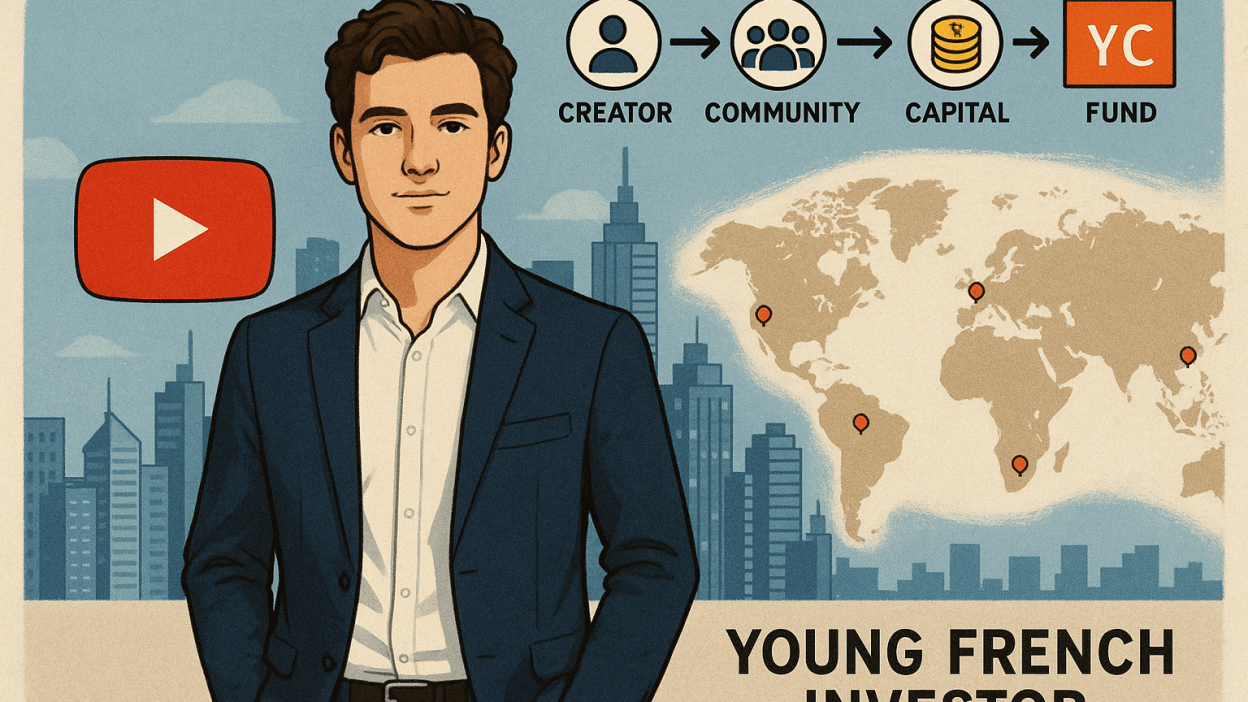A New Face of Venture Capital
The worlds of YouTube and venture capital may seem far apart—one thrives on creativity, storytelling, and audience engagement, while the other deals in balance sheets, deal terms, and long-term bets on disruptive ideas. Yet, the digital age has proven that unconventional paths can lead to extraordinary opportunities.
This is the story of a French investor who began as a YouTube creator, building a loyal online community, before making the leap into venture capital. In a move that has attracted global attention, this creator-turned-investor has successfully raised a $12 million fund dedicated to backing Y Combinator (YC) startups, one of the most prestigious startup ecosystems in the world.
The story is about more than just money. It signals a fundamental shift in how influence, credibility, and capital are being generated. As creators evolve into investors, they bring new energy, perspectives, and global reach into a venture landscape traditionally dominated by institutional players.
From Creator to Capital Allocator
Not long ago, being a YouTuber was seen as a hobby or at best a side hustle. But today, creators are entrepreneurs in their own right. They build brands, manage communities, and often generate revenues rivaling small companies.
For this French creator, YouTube was the proving ground. Through consistent content—whether explaining startup trends, breaking down business models, or interviewing founders—he carved out a niche audience hungry for insights into entrepreneurship and innovation.
-
Trust-building: By demystifying startup culture, he gained the trust of thousands of followers who saw him as a credible voice.
-
Network effect: As the audience grew, so did his access to entrepreneurs and investors across Europe, the US, and Asia.
-
Shift in role: From commentator to participant—eventually realizing that knowledge and networks could be transformed into capital allocation.
This pivot is emblematic of a broader trend: creators no longer simply observe industries, they increasingly shape them.
The $12M Fund: Why Y Combinator?
Y Combinator has become synonymous with startup success. Its alumni list reads like a tech hall of fame: Airbnb, Dropbox, Stripe, Coinbase, Reddit—all began as YC-backed ventures. In 2024 alone, YC startups raised billions collectively, with many achieving unicorn status within a few years.
By raising a $12 million fund specifically for YC startups, the French investor strategically positioned himself in the slipstream of one of the most efficient startup accelerators.
-
De-risking the bet: YC’s selection process is notoriously competitive, meaning the startups that graduate already carry a certain level of validation.
-
Global footprint: While YC began in Silicon Valley, it now attracts talent from across India, Africa, Europe, and Southeast Asia. This provides the fund global diversification.
-
Community advantage: Founders who go through YC often stick together, creating a tight-knit ecosystem that investors can tap into for deal flow and co-investment opportunities.
In other words, the fund isn’t just about money; it’s about gaining a seat at the table in one of the world’s most influential startup networks.
Why Content Creators Make Unique VCs
The transition from creator to investor may raise eyebrows, but creators often possess skills that traditional investors lack.
Audience Insight
Creators are trained to spot what resonates with audiences. They analyze data, interpret feedback, and pivot quickly. This is not unlike identifying consumer trends before they hit the mainstream—an invaluable skill for early-stage investing.
Community Trust
While institutional investors rely on brand names and track records, creators build authentic, personal connections with their audiences. This trust translates into influence, which can help startups gain early adopters and advocates.
Storytelling Advantage
Startups live and die by their ability to tell a compelling story—to customers, to employees, to investors. A creator-turned-VC inherently understands narrative, making them powerful allies in a founder’s journey.
This intersection of media and money is creating a new breed of investors who are as comfortable in front of a camera as they are in a boardroom.
Pros and Cons of Creator-VCs
Pros
-
Fresh Perspective: They bring creativity and intuition to industries often bogged down in spreadsheets.
-
Brand Equity: Their digital presence amplifies both the fund and portfolio companies.
-
Deal Flow: Communities often surface promising founders organically, reducing reliance on traditional scouting.
Cons
-
Experience Gap: Traditional VCs may argue that creators lack the institutional rigor needed for due diligence.
-
Hype vs Fundamentals: Risk of prioritizing “trendy” startups over sustainable models.
-
Dual Identity: Balancing public persona and professional responsibilities can be challenging.
The balance lies in whether creators can complement their strengths with structured investment processes and experienced partners.
Case Studies: Global Parallels
This French investor is not alone. Around the world, content creators are increasingly stepping into venture capital.
-
MrBeast (US): Known globally for his YouTube empire, he has invested in food and technology ventures, often leveraging his audience to test and scale products.
-
Casey Neistat (US): Pivoted his influence into co-founding Beme, which was later acquired by CNN.
-
India & Southeast Asia: Influencers are backing D2C brands, fintech apps, and creator economy startups. Their communities become instant customer bases, giving them an edge over traditional investors.
These examples highlight a global trend: influence is becoming a new form of capital.
What This Means for the Startup Ecosystem
For Founders
Creator-backed funds mean access to investors who understand marketing, digital communities, and storytelling. This can be especially valuable for startups trying to break into consumer markets.
For Investors
Institutional VCs may initially see creators as outsiders. But increasingly, they recognize the value of partnering with creator-investors who can de-risk consumer adoption.
For Audiences
Communities that once just watched videos are now indirectly part of the entrepreneurial journey, seeing their favorite creators back real companies that might change lives.
This interconnectedness adds a layer of democratization to venture capital—it feels more accessible, relatable, and human.
Global Trends and Statistics
-
The global creator economy is estimated to be worth over $250 billion by 2027 (Goldman Sachs).
-
Micro-VC funds (under $50M) have grown steadily, with creator-led funds representing a small but rapidly expanding segment.
-
Y Combinator startups have collectively raised more than $80 billion in funding, making them one of the most attractive pipelines for investors globally.
These numbers underline why a $12M fund by a creator is both ambitious and strategically sound.
FAQs
Q1: Why is this fund significant?
Because it validates the idea that influence and storytelling can translate into real venture capital impact.
Q2: Can creators really compete with traditional VCs?
Yes, especially when paired with experienced advisors. Their unique strengths complement institutional rigor.
Q3: Will this trend continue globally?
Absolutely. With creators emerging across Africa, India, and Latin America, expect more region-specific funds blending community and capital.
A New Chapter in Venture Capital
This French investor’s journey from YouTube creator to venture capitalist isn’t just a personal milestone—it reflects a broader transformation in how entrepreneurship is funded and supported. The rise of creator-investors signals that capital is no longer just about financial expertise—it’s also about cultural insight, community building, and narrative power.
For startups, it means new types of allies. For the venture world, it means new competition. For audiences, it means the lines between creators and capitalists are blurrier than ever.
Takeaway: In the coming decade, expect the rise of creator capitalists to be one of the most disruptive forces in global entrepreneurship.
Subscribe to our newsletter for more stories at the intersection of startups, venture capital, and the creator economy.
Note: All logos, trademarks, and brand names referenced herein remain the property of their respective owners. The content is provided for editorial and informational purposes only. Any AI-generated images are illustrative and do not represent official brand assets.



